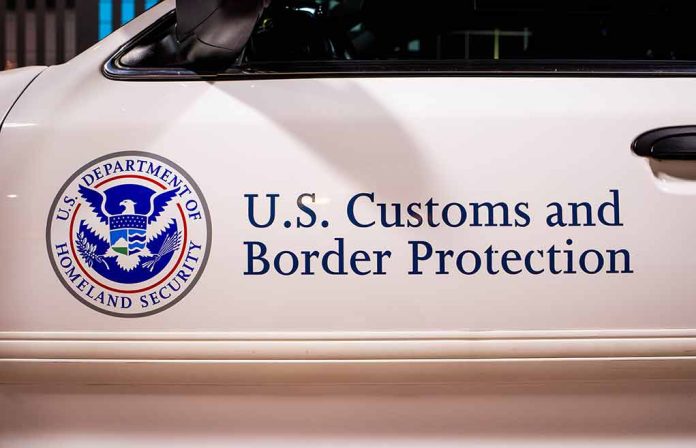🔴 Website 👉 https://u-s-news.com/
Telegram 👉 https://t.me/usnewscom_channel
The Trump administration’s bold order to “Fire up the deportation planes” marks the most aggressive immigration enforcement action in decades as DHS launches a comprehensive strategy combining self-deportation incentives with Supreme Court-backed removals to third countries.
Key Takeaways
- The Trump administration has repurposed the CBP One app into “CBP Home” to encourage self-deportation with $1,000 exit bonuses, subsidized airfare, and temporary protection from ICE enforcement.
- A recent Supreme Court ruling allows the administration to deport illegal immigrants to third countries without requiring them to demonstrate potential harm at their destination.
- DHS has launched a $200 million ad campaign promoting self-deportation while implementing fines and criminal penalties for those who refuse to leave.
- The administration has strongly criticized “activist judges” who previously blocked deportations of dangerous criminals, including murderers and drug traffickers.
- Liberal Supreme Court justices Sotomayor, Kagan, and Brown Jackson dissented from the decision allowing third-country deportations.
Trump’s Self-Deportation Initiative Offers Cash Incentives to Leave
The Department of Homeland Security has unveiled a comprehensive approach to address illegal immigration by introducing financial incentives for voluntary departure. The CBP Home app, repurposed from the Biden administration’s CBP One platform that previously scheduled legal entry appointments, now offers a $1,000 “exit bonus,” subsidized airfare, and temporary protection from ICE enforcement for those who choose to self-deport. This strategy represents a significant shift from previous approaches, creating a carrot-and-stick system that rewards compliance while threatening consequences for those who remain illegally in the country.
The administration has not relied solely on incentives, implementing substantial penalties for non-compliance. Migrants who decline to self-deport now face potential fines and criminal penalties. To promote awareness of these options, DHS has invested $200 million in an advertising campaign with messaging that frames self-deportation as a dignified option. Public messaging has taken a direct approach with slogans emphasizing the consequences of remaining illegally in the United States while offering a pathway to potential legal return in the future.
“Do what’s right, leave now,” said Kristi Noem.
Supreme Court Ruling Enables Third-Country Deportations
In a major victory for the administration’s immigration enforcement agenda, the Supreme Court has overturned lower court restrictions on deportations to third countries. This landmark decision enables federal authorities to deport illegal immigrants to nations other than their countries of origin without providing them the opportunity to demonstrate the potential harm they might face upon arrival. The ruling specifically removes requirements previously imposed by lower courts that mandated the government provide migrants a “meaningful opportunity” to express concerns about torture or other dangers at their destination.
“If these activists judges had their way, aliens who are so uniquely barbaric that their own countries won’t take them back, including convicted murderers, child rapists and drug traffickers, would walk free on American streets,” according to a DHS statement.
The ruling was not unanimous, with the court’s liberal justices —Sonia Sotomayor, Elena Kagan, and Ketanji Brown Jackson —registering their dissent. This ideological split reflects the broader national debate over striking a balance between immigration enforcement and due process concerns. Immigration rights groups have responded by filing a class action lawsuit challenging these rapid deportations, arguing that the practice violates fundamental rights by removing individuals without notice or opportunity to assert claims of potential harm. Despite these objections, the administration has moved forward with implementation, considering countries like Libya as possible destinations.
Defending National Security Through Aggressive Enforcement
The Department of Homeland Security has defended its deportation strategy as essential to protecting American citizens, directly addressing critics who claim the approach lacks compassion. In official statements, DHS has characterized the Supreme Court ruling as “a victory for the safety and security of the American people,” emphasizing that the administration’s priority is protecting law-abiding citizens from potential threats posed by illegal immigrants with criminal backgrounds. This messaging reflects a clear shift from the previous administration’s policies, which conservatives criticized for prioritizing immigrant concerns over national security interests.
“The Supreme Court ruling is a victory for the safety and security of the American people,” according to a DHS statement.
Public polling has largely supported the administration’s robust approach to immigration enforcement, reflecting widespread concern about border security that contributed to Trump’s electoral victory. The administration has characterized its actions as necessary but difficult decisions required to address what it views as a crisis created during the previous administration. By focusing enforcement efforts on those with criminal records while simultaneously providing incentives for voluntary departure, the Trump administration has created a multi-faceted strategy that addresses both immediate security concerns and long-term immigration policy goals.

